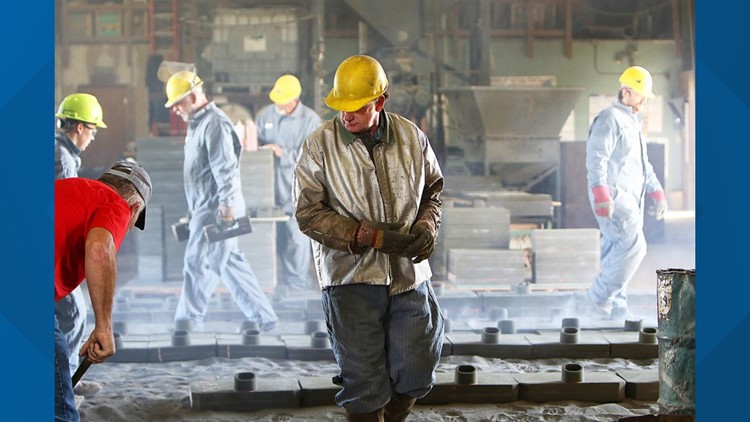CALDWELL, Idaho — What began as a small wheat farm near Colfax, Washington, in the 1950s is now a second-generation-owned warehouse, foundry and welding shop in Caldwell that distributes thousands of farm tools across the U.S.
R & H Machine, Inc. is the only facility in the Treasure Valley that makes and distributes large scale “wear parts,” or replacement parts for farm equipment, made of chrome alloy, a long-lasting material comprising various metals.
The little-known business is one of roughly 1,700 manufacturers in Idaho, which employ 6% of the state's workforce and contribute more than $7.3 billion to GDP, according to the Southwest Idaho Manufacturers’ Alliance.
The alliance will put a spotlight on manufacturers next month at its annual "Made Here" expo and job fair at the Ford Idaho Center in Nampa. R & H will be among the exhibitors, and earlier in the month the Caldwell business will also host public tours.
“People are welcome to come check us out,” said Brock McGarrah, R & H production manager. “The thing I have found after working here for five years is that a lot of local people do not know that we are here.”
THE MATERIAL
R & H is one of few foundries — a place were metal castings are made — that uses chrome, McGarrah said.
“We use it because it is very good in agriculture — it lasts longer than a standard part,” he said.
Dave Organ, owner and head of operations, said the chrome alloy they use was originally used for rock crushing. Organ’s father-in-law, Ray Stueckle, had a welding business on his farm in Washington in the 1950s to supplement his income from the farm. Organ said Stueckle welded his own farm parts and parts for his neighbors. His specialty was hardfacing parts, or welding harder material to a base metal to strengthen it. For this process, he was using chrome alloy.
Stueckle's early innovation planted the seed for what would eventually become R & H Machine.
R & H Machine moved its operation to Caldwell in 1978. Before, the business had offices across Idaho and in Washington; it needed a single location to minimize the miles Organ was putting on his pickup.
After almost three decades in Caldwell, the foundry that was previously Gem State Alloys, Inc. merged with R & H Machine to streamline the process in 2006. The foundry is located steps away from the R & H Machine office building.
R & H Machine has about 15 employees, some who have been at the company since the 1980s, said Organ. He said the company has little turnover — which is good, considering how difficult it can be to hire new workers in a market with a low unemployment rate. Organ said he has welders and other production people who have been at the company anywhere from six years to 15 years and longer.
Production workers at R &H Machine pour and prepare a concoction of chrome, carbon, manganese, molybdenum, silicon and scrap steel once a week. The roughly 6,000 pounds of metal poured each week are used in a variety of replacement tools for tractors, planters, fertilizer spreaders, mulchers and other machines.
THE PROCESS
Each tool starts as a mold.
R & H Machine's molds are made out of sand and glue. The sand mixture is put into a wooden pattern, made by Organ at the facility. The patterns are made of thousands of replaceable farm tools.
The sand mixture is poured into half of the mold, with the other half made the same way. Any holes for bolts must be made with corks before the metal is poured. The chrome alloy mixture can’t be drilled, so the holes must be perfect for each machine.
The two molds are glued together with a hole in the top where the hot metal mixture will go.
R & H uses 75% recycled metal in its hot metal mixture. McGarrah purchases scrap metal from the community.
The alloys and scrap metal are placed into the furnace and heated to about 2,800 to 3,000 degrees.
Workers lay the molds out on a sand covered floor in the foundry, and weights are placed on top of the molds to make sure they don't move when the chrome alloy is poured.
A pouring ladle is filled with the hot mixture, and two or three workers go down the line of molds and pour the mixture into the molds one at a time.
The whole tool is cast solid with the same material.
The mold is hardened and cooled. It will not be taken out of the mold for a day or overnight period.
Once the parts are broken out of the molds, the molds are ground back into sand for reuse. The parts are cleaned in a machine using steel shot, or small grains of steel, to remove any sand from the finished part.
Every single hole and surface of every product is checked by hand, McGarrah said.
“It is quality. You don't want this part going to Florida and someone calls and says it doesn't fit,” he said. “We want every part to be quality when it leaves here so there is a quality check that has to be done. Once you put this part in the ground, it will run forever.”
Once the tools are checked, they are either ready to be shipped out or to be welded. R & H welds together tools when a farmer needs a product that is made of more than one part.
The welded products are then cleaned in the steel shot machine — one of the last steps before they're ready to be shipped.
FOR LOCAL FARMERS
Fred Brown, head of accounts receivable at R & H , estimated that about a third of R & H’s products are shipped throughout Idaho. The rest go across the country.
McGarrah said they try to keep a lot of parts stocked in their warehouses, because “you never know when someone is going to call and want 100 parts of something.”
“Since we are stretched out across the whole U.S., the seasons are different back East and in California, so taking that into consideration, (our parts) are constantly moving,” he said.
Organ said nearly all of the company's sales are through word of mouth among farmers. Staff go to farm shows across the country to exhibit their products and have a few dealers who sell their products, but do not do any outside sales. McGarrah said local farmers often call or come into the shop to get parts directly.
MANUFACTURING MONTH
Manufacturers are facing a shortage of workers, said Sheri Johnson, executive director of the Southwest Idaho Manufacturers’ Alliance. With the state seeing the unemployment rate at a consistent 3% or lower, fewer people are looking for work in the manufacturing industry.
The manufacturers’ alliance is a group of organizations focused on sharing information about manufacturing in southwest Idaho and growing the industry in the region. The organization is hosting “Made Here” on Oct. 16, an exhibition and job fair dedicated to attracting workers and educating the community on manufacturing jobs.
The event is part of Manufacturing Month.
“Manufacturing work is not very sexy,” Johnson said. “People all hear about other industries here, but don’t know there are over 1,700 manufacturers in Idaho.”
Johnson said the manufacturers in Idaho send products across the country and overseas, but they often don’t have up-to-date websites because the industry hasn’t demanded that from them yet. Her alliance wants to do the promotional aspect for the industry by hosting the job fair and expo.
“We want to shine on them,” Johnson said.
McGarrah said he doesn't think people realize how many products and tools are still made by pouring metal and welding. He added that he believes some kids today think food comes from the grocery store.
Johnson said "Made Here" is about educating students and the next generation of workers about manufacturing jobs.
According to a nationwide survey distributed by Deloitte, an accounting organization, 64% of people who attended Manufacturing Day events were "more motivated to pursue careers in manufacturing."
Johnson said in Idaho, the average compensation per job for manufacturing jobs is 40% higher than in other industries in Idaho. She added that entry-level positions in manufacturing often pay $12-15 an hour.
R & H Machine is an exhibitor at the "Made Here" event on Oct. 16. As part of Manufacturing Month, R & H will host tours of its foundry and facility. The American Foundry Society, an Illinois organization dedicated to promoting foundries across the U.S., is encouraging foundries to open their doors for tours.
Manufacturing Day is celebrated on Oct. 4, McGarrah said, but since the company tries not to pour metal right before the weekend, they will be hosting tours on Thursday, Oct. 3.
McGarrah said he also plans to have a tour for high school students in October and give them the opportunity to help pour metal on a smaller scale.
"Certain young people, once they see hot metal poured, they will want to do that for the rest of their life," said Rich Jefferson, foundry society spokesman.
Jefferson said educating the community about foundries and manufacturing can open doors for potential employees and encourage people to stay in the place they grew up.
This article originally appeared in the Idaho Press, read more on IdahoPress.com.
More from our partner Idaho Press: Ada County files motion to dismiss Idaho Press Club lawsuit
Watch more 'Growing Idaho':
See them all in our YouTube playlist:



